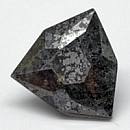|
ClassicGems.net |
|
|
 |
| Kurchatovite |
|
|
Discovered in 1965; IMA status: Valid (IMA Approved 1966) |
|
|
|
Chemistry |
|
|
| |
|
Ca(Mg,Mn2+,Fe2+)B2O5 | |
|
|
Calcium Magnesium Manganese Iron Borate |
|
Molecular Weight: |
178.34 gm |
|
Composition: |
Calcium |
22.47 % |
Ca |
31.44 % |
CaO |
|
|
Magnesium |
8.18 % |
Mg |
13.56 % |
MgO |
|
|
Manganese |
9.24 % |
Mn |
11.93 % |
MnO |
|
|
Iron |
3.13 % |
Fe |
4.03 % |
FeO |
|
|
Boron |
12.12 % |
B |
39.04 % |
B2O3 |
|
|
Oxygen |
44.86 % |
O |
|
|
|
|
|
100.00 % |
|
100.00 % |
= TOTAL OXIDE |
|
|
|
||||
|
Classification |
|
|
| |
|
Borates | |
|
5/H.01-30 | |
|
|
6 : BORATES
|
|
Related to: |
Dimorph of Clinokurchatovite. |
|
Varieties: |
None |
|
Synonyms: |
ICSD 200803, IMA1965-034, PDF 43-689 |
|
|
|
|
Crystal Data |
|
|
|
|
|
Granular, to 4 mm. |
|
|
None |
|
|
|
|
|
Physical Properties |
|
|
|
|
|
One perfect, parallel elongation; two others, imperfect. |
|
|
n/a |
|
|
Brittle |
|
|
4.5 |
|
|
3.20 (g/cm3) |
|
|
Fluorescent; bright violet under long wave UV light |
|
|
Not Radioactive |
|
|
|
|
|
Optical Properties |
|
|
|
|
|
Pale gray |
|
|
Semitransparent to transparent |
|
|
Vitreous |
|
|
1.635 - 1.698 Biaxial ( - ) |
|
|
0.063 |
|
|
None |
|
|
Slight; r > v |
|
|
|
|
|
Occurances |
|
|
|
|
|
Geological Setting: |
In an iron-bearing skarn (Solongo deposit, Russia). |
|
Common Associations: |
Clinokurchatovite, Szaibélyite, Solongoite, Hexahydroborite, Calcite, Chlorite, Vesuvianite, Garnet, Svabite, Magnetite, Sphalerite (Solongo deposit, Russia). |
|
Common Impurities: |
None |
|
Type Locality: |
Solongo B deposit, Vitim Plateau, Buriatia Republic (Buryatia), Transbaikalia (Zabaykalye), Eastern-Siberian Region, Russia |
|
Year Discovered: |
1965 |
|
View mineral photos: | |
|
|
|
|
Unusual Gem Categories |
|
|
|
|
|
|
|
|
|
|
|
More Information |
|
|
|
|
|
| |
|
|
|
|
Kurchatovite is a very rare borate mineral that was discovered in 1965 at the Solongo B deposit, Vitim Plateau, Buriatia Republic, Transbaikalia, Eastern-Siberian Region, Russia. This is the only location for Kurchatovite. It is typically found in a matrix of white Dolomite as light gray granular crystals to about 4 mm with vitreous luster and Mohs hardness of about 4.5. Kurchatovite is a fluorescent mineral showing bright violet under long wave UV light. Kurchatovite was named to honor Igor Vasil’evich Kurchatov (1903–1960), Russian physicist, Institute of Nuclear Energy, Moscow, Russia. Kurchatov was a Soviet nuclear physicist who was the director of the Soviet atomic bomb project and is remembered as the "father of the Soviet atomic bomb" for his directorial role in the development of the Soviet nuclear program in a clandestine program during World War II. Kurchatovite distribution: in Russia, from the Solongo boron deposit, Buryatia, and at the Novofrolovskoye copper deposit, near Krasnoturinsk, Turinsk district, Northern Ural Mountains. |
|
|
Kurchatovite gems for sale: We have not photographed our Kurchatovite gems yet. Please check back soon. |